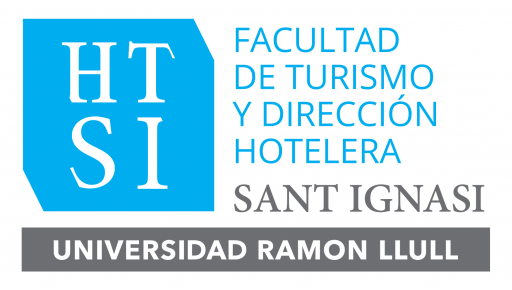
HTSI - School of Hospitality, Tourism and Hotel Management
The School of Tourism and Hospitality Management Sant Ignasi (HTSI) of Ramon Llull University promoted by the Society of Jesus and the ESADE Foundation, promotes teaching, research and dissemination of knowledge in the areas of leadership and management of hotel and tourism business. Its mission is to contribute to the scientific, social and humanistic training of professionally competent graduates who are aware of their responsibility to contribute to a humanized development of tourism and hospitality in the context of intercultural dialogue. HTSI, as part of the Universitat Ramon Llull is again positioned as one of the best institutions to study tourism in Spain and this year it is placed as the 2nd best university institution in Spain in the field "Hospitality and Leisure Management" in the QS World University Ranking by Subjects 2020.
Bachelors Events Management and Protocol
The first two years of the Bachelor Degree you discover the different professional opportunities offered by the sector, which is key to world economic growth. The basic training you will receive these first two years and the professional development guidance offered exclusively by HTSI will give you the tools you need so that in your third year you can decide which specialization best fits your professional future.
These specializations combine specific training (completed at HTSI or international universities through student exchange) with specialized internships at companies that stand out in each of their international areas. This will give you first-hand experience of current challenges and trends in your new professional future. Once you graduate, your specialization will be included in your European Diploma Supplement.
The specialization in Events Management and Protocol will help you become an expert in the strategic management of events and relevant protocol rules. In this specialization, you will get the knowledge and skills you need for roles involving the planning and organization of events and the use of protocol in different professional areas (business, social, institutional)
Semester 1
• Business Economics
• Tourism Markets
• Geography
• Social Philosophy
• Communication Skills
• English 1
• German/French
Semester 2
• Economics
• Internet Content Strategy
• Data Management Skills
• English 2
• Tourism Typologies
• Service Encounters in Tourism and Hospitality
• German/French
Semester 3
• Statistics
• Tourism Sectors
• Human Resource Management
• Marketing Fundamentals
• Data Analysis in Tourism and Hospitality
• English 3
Semester 4
• Tourism Law
• Accounting
• Electronic Distribution in Tourism and Hospitality
• Persuasive Communication
• Tourism Anthropology and Sociology
• Personal and Professional Skills for Tourism and Hospitality Management
• English 4
• German/French
Semester 5
Financial Management in Tourism and Hospitality
• Operational Marketing in Tourism and Hospitality
• Cross-cultural Communication
• Hotel and Restaurant Management
• Events Management
• Revenue Management
• German/French
• Business Intelligence
Semester 6
• International Hospitality Management
• Events Management and Protocol
• Innovation and Digital Transformation in Tourism
• Responsible Tourism in Urban Destinations
• Tourism and Hospitality Consultancy
• Experience Management in Tourism and Hospitality
Semester 7
• Internship
Semester 8
• Business Strategies and Corporate Social Responsibility in Tourism and Hospitality
• Innovation and Entrepreneurship
• Business Ethics in Tourism and Hospitality
• Destination Management
• Degree Thesis
Candidates coming from educational systems other than the Spanish system must comply with the requirements included in the Resolution of July 6, 2010, of the General Secretariat of Universities, amended Annexes I and IV of Order EDU / 1161 / 2010, of May 4, which establishes the procedure for access to Spanish Universities by students from educational systems for which Article 38.5 of Organic Law 2/2006, of May 3, Education is applied.
A) Candidates who have completed their studies in a school in Spain with an education system specific to a member country of the European Union (other than Spain) or with bilateral agreements with the Government of Spain on the homologation of secondary studies, National University Distance Studies – UNED): they must apply to UNED for a credential that they meet the requirements for access to university studies. It is imperative to present this credential in order to enroll. In most cases, schools perform this procedure for their students. If this is not the case, the candidate must carry out this process on their own
B) Foreign candidates coming from an educational system of an EU country other than Spain or from a country with bilateral agreements with the Government of Spain on homologation of secondary school studies (according to UNED):
It is necessary to:
• Have passed the equivalent second of Spanish High School in their home country´s educational system or have the International Baccalaureate.
• Request the UNED credential for access to university, certifying the candidate meets the requirements to access university studies. It is imperative to present this credential in order to be able to enroll in the center.
C) Foreign candidates who come from an educational system of a country that does not belong to the European Union and that has not signed a bilateral agreement with the Government of Spain on the homologation of secondary school studies (the document of the UNED indicates countries with bilateral agreements that do not need to carry out this process).
It is necessary:
• To be studying the equivalent in your educational system to the second year of Spanish high school (and to have passed it in June), or have already successfully completed it. (Applications from people who have completed second year of high school or equivalent in the last two years will also be accepted).
• To process the homologation of their studies through the Spanish Embassy in their country of origin (preferably) or through the Department of Education of the Generalitat de Catalunya.
Requirements to get a Spanish student visa?
Before you schedule an appointment at the Spanish Embassy in your country there are a few documents you need to have ready. These visa preparation documents highly vary per nationality and sometimes even per state department of your country. See here a list of requirements that usually need to be presented.
• National visa application form
• Biometric pictures
• Passport with expiry date at least 6 months past the date you are applying for
• Health Insurance Letter from Spanish provider
• Medical Examination, following the current requirements of the Spanish Health Association
• Accommodation Letter
• Bank statement, showing that you can financially sustain yourself during your whole stay in Spain (this amount varies every year, contact us for the up-to-date requirements)
• Invitation and offer letter from a Spanish academic institution
• Visa fees paid
• Most of these documents need to be translated into Spanish by a sworn translator and legalized by the notary or Spanish authorities, depending on your country of origin.
LEAP has a visa success rate of 95%. Contact one of you educational experts to enlarge your acceptance chance



